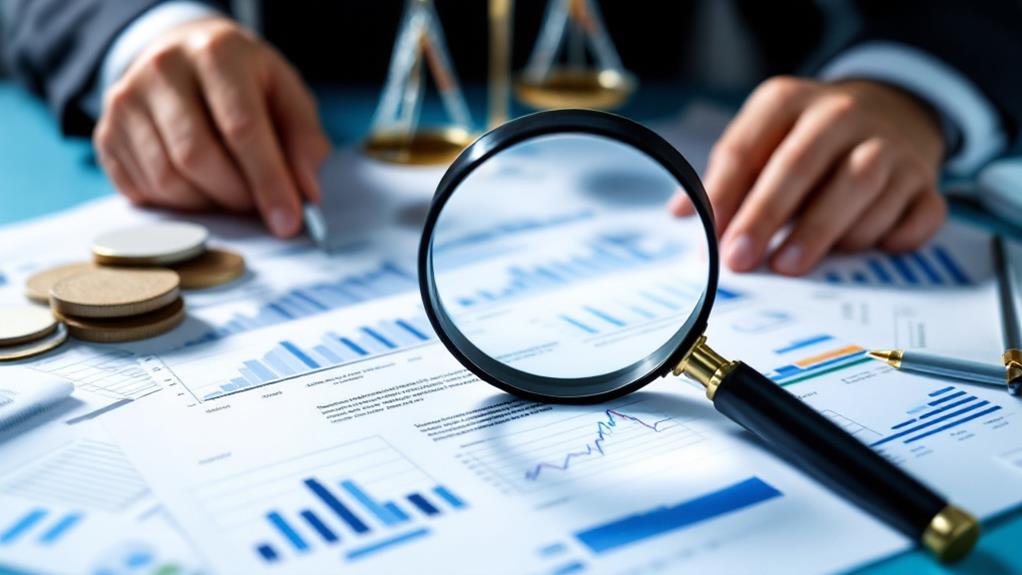What Is Professional Skepticism?

Professional skepticism is your ability to maintain a questioning attitude and critically assess information, especially important in fields like auditing and research. You need this mindset to scrutinize details, challenge assumptions, and evaluate evidence independently. It guarantees your judgments are unbiased and grounded in reality, crucial for upholding ethical standards and building trust. This skeptical approach is fundamental for detecting fraud and maintaining the integrity of financial reporting. By honing your critical thinking skills, you improve your ability to uncover inconsistencies and potential irregularities. Embracing this mindset equips you to navigate complexities and uncover deeper insights.
Understanding Professional Skepticism
When you dig into the concept of professional skepticism, it's clear that this mindset is fundamental in fields like auditing and research. At its core, professional skepticism involves a questioning attitude and critical assessment, rooted deeply in philosophical foundations. This approach is not unlike the efforts of individuals such as Isaac Asimov and Susan Blackmore, who have remarkably contributed to the scientific skepticism movement through their exploration of paranormal claims and consciousness. You might trace this mindset back to the ancient Greek philosophers, who emphasized inquiry and doubt as crucial tools for uncovering truth. These early thinkers laid the groundwork for the rational and objective evaluation that professional skepticism demands today.
Exploring its historical context, you'll find that professional skepticism evolved markedly over centuries. During the Enlightenment, a period marked by reason and scientific exploration, skepticism began cementing its role in intellectual discourse. This period highlighted the importance of evidence-based reasoning, which is now a cornerstone of professional skepticism. By the 20th century, with the rise of complex industries and global markets, skepticism became essential for professionals tasked with analyzing intricate data and systems.
In essence, understanding professional skepticism requires acknowledging its deep roots in philosophical inquiry and its evolution through history. By embracing skepticism, you're not just doubting for doubt's sake, but aiming for a deeper, more reliable understanding of the world around you.
Importance in Auditing

Recognizing the historical roots of professional skepticism helps highlight its fundamental role in auditing today. As an auditor, you understand that maintaining high audit quality hinges on your ability to question assumptions and verify information. This mindset guarantees that you uphold ethical standards, which is imperative for risk assessment and regulatory compliance. Just as scientific claims can be falsified, professional skepticism requires rigorous testing and validation. By exercising independent judgment, you're not just ticking boxes; you're actively protecting the interests of stakeholders who rely on your insights.
Your decision-making process improves when you adopt skepticism, as it leads you to investigate all angles and consider alternative explanations. This careful scrutiny builds stakeholder trust, knowing that you've thoroughly evaluated the information. In turn, this trust amplifies the credibility of the financial statements you audit, reinforcing the health and transparency of financial markets.
Moreover, professional skepticism is significant for your professional development. By continually honing this skill, you're better equipped to face new challenges and adapt to evolving industry standards. It's not just about questioning what's in front of you but also about growing as a professional who can navigate complex situations with confidence. In short, skepticism isn't just a mindset; it's a cornerstone of effective auditing.
Key Characteristics

In understanding professional skepticism, you'll find that it embodies key characteristics essential for effective auditing. Initially, you need an analytical mindset. This involves scrutinizing details and seeing beyond the surface, helping you uncover anomalies in financial statements. A questioning attitude is fundamental because it encourages probing deeper into issues, rather than accepting information at face value.
Evidence evaluation is another crucial characteristic. You must assess the reliability and relevance of evidence, guaranteeing your conclusions are well-founded. Independent judgment is vital, allowing you to form unbiased opinions free from external influences or cognitive biases. By maintaining objectivity, you can avoid ethical pitfalls and uphold the integrity of your audit work.
Risk assessment is also integral to professional skepticism. You should identify and evaluate potential risks that could impact the audit's outcome, ensuring you're prepared for any uncertainties. Throughout the decision-making process, ethical considerations must guide your actions. This guarantees that all decisions are made with integrity, fairness, and transparency.
Challenges Faced

Professional skepticism, despite its necessity, presents several challenges that auditors must navigate. Initially, you might encounter cognitive biases that cloud your judgment. These biases can lead you to make assumptions that aren't entirely accurate, affecting the quality of your audits. Coupled with this, emotional intelligence is essential. You need to manage your emotions effectively while understanding others', especially when dealing with ethical dilemmas. These situations can test your professionalism and moral compass.
Communication barriers also pose a significant challenge. Misunderstandings can arise with clients or team members, impacting the audit's success. Training challenges further complicate matters, as staying updated with the latest practices requires time and resources. You might also face cultural differences, which can influence how information is interpreted and shared.
Resistance to change is another hurdle. Colleagues or clients may be comfortable with the status quo, making it difficult to implement necessary changes. Time constraints are ever-present in the auditing world. Balancing thoroughness with deadlines requires careful planning and prioritization. These challenges demand a strong commitment to continuous improvement and adaptation to maintain the effectiveness of professional skepticism in your auditing practices.
Role in Fraud Detection

In the domain of fraud detection, professional skepticism plays an vital role in uncovering irregularities. You need to approach each audit with a questioning mind, recognizing that fraud prevention isn't just about following procedures—it's about understanding human behavior and detecting subtle behavioral cues. Auditor training should emphasize these skills, ensuring you can navigate ethical considerations and apply effective investigative techniques.
Risk assessment is fundamental in identifying areas where fraud is most likely. By integrating technology, you can improve your ability to analyze data, uncover discrepancies, and recognize patterns that might indicate fraudulent activity. Technology integration also allows you to keep up with evolving regulatory frameworks and case law, ensuring compliance and strengthening your investigative efforts.
Teamwork dynamics can't be overlooked, as collaboration often leads to more thorough investigations. Sharing insights and discussing potential issues with colleagues helps you maintain a balanced perspective. Remember, professional skepticism isn't about distrusting everything but rather about maintaining a healthy level of doubt. This mindset enables you to remain vigilant, analyze situations critically, and ultimately contribute to effective fraud detection and prevention. By honing these skills, you're better equipped to protect an organization's integrity.
Enhancing Critical Thinking

Critical thinking often acts as the backbone of effective fraud detection and prevention. You're probably already aware that honing this skill can be a game-changer in identifying inconsistencies or deceptive practices. By engaging in critical inquiry, you question assumptions, seek evidence, and evaluate arguments. This isn't just about spotting errors; it's about understanding why they occur and how they can be prevented.
To improve your critical thinking skills, focus on developing strong analytical reasoning. This involves breaking down complex information into manageable parts, examining each element, and understanding their interrelationships. By doing so, you can assess situations more thoroughly and make well-informed decisions.
Start by asking open-ended questions that challenge the status quo. Instead of accepting information at face value, dig deeper to uncover underlying motives or overlooked details. Practice analyzing case studies or scenarios related to fraud, as this can sharpen your ability to identify red flags.
Practical Application Techniques

Regarding putting essential thinking into practice, you've got to roll up your sleeves and engage yourself in real-world scenarios. A skeptical mindset is vital. Begin by questioning assumptions rather than accepting them at face value. When presented with information, ask yourself: what is the evidence? Who benefits from this viewpoint? Is there an alternative explanation? These questions help you dig deeper and uncover truths that might otherwise remain hidden.
Developing a habit of listening actively is another practical technique. Pay attention not just to what's being said, but also to what's not being said. This can reveal underlying biases or gaps in information. Engage in discussions that challenge your viewpoints, as these conversations can sharpen your ability to evaluate evidence critically.
Additionally, practice reflective thinking. After analyzing a situation, take time to reflect on the process. Did you overlook any assumptions? Was your skeptical mindset strong enough to resist biases? This reflection aids in refining your approach for future scenarios.
Case Studies and Examples

Exploring real-world examples can illuminate the power of professional skepticism in action. Imagine you're an auditor during the Enron scandal, a historical example where skepticism was vital. Had auditors questioned the complex financial structures and accounting practices, the outcome might've been different. This case shows how real-world applications of skepticism can disclose hidden truths and prevent financial disasters.
Consider the ZZZZ Best case in the 1980s. If you were part of the audit team, applying skepticism might've led you to question the legitimacy of the company's restoration contracts. Digging deeper, you would've found that these contracts were fabricated, preventing the fraud from reaching the massive scale it did. This historical example underscores the importance of skepticism in verifying claims.
In a more recent scenario, think about the Volkswagen emissions scandal. As an engineer or regulator, you'd need to question the emissions tests and results thoroughly. Had skepticism been applied earlier, it might've revealed the manipulation sooner, minimizing the environmental and financial impact.
These examples highlight how employing professional skepticism in real-world applications can uncover discrepancies and challenge misleading information, reinforcing its vital role in professional practice.
Impact on Financial Reporting

While real-world examples illustrate the power of professional skepticism, its impact on financial reporting is where its influence can be most profound. By questioning and verifying financial data, you guarantee financial accuracy, which is essential for maintaining investor confidence and transparency. Without a skeptical eye, errors or misstatements can slip through the cracks, leading to significant financial discrepancies that could mislead stakeholders.
You must also consider ethical considerations when applying professional skepticism in financial reporting. It helps you to challenge assumptions and identify any potential biases or manipulations in financial statements. By doing so, you uphold ethical standards and protect the integrity of the financial reporting process. This is not just about numbers; it's about making certain that the financial information presented is truthful and reliable.
In your role, exercising professional skepticism means always being alert and questioning the validity of the financial information you're handling. It empowers you to make informed decisions and provide accurate financial insights. Ultimately, professional skepticism is a safeguard against financial inaccuracies and ethical lapses, guaranteeing that the financial reporting process remains robust and trustworthy for all stakeholders involved.
Future Trends and Developments

Anticipation surrounds the future trends and developments in professional skepticism within financial reporting. As the landscape evolves, you'll see technology integration playing a crucial role, potentially reshaping how skepticism is applied. With AI and data analytics, there are both opportunities and ethical implications to evaluate. Training programs must adapt, ensuring the future workforce is equipped to handle these advancements.
Regulatory changes will likely continue, demanding you to stay informed about evolving standards. This might include new guidelines that better address stakeholder expectations and the nuances of cultural influences. As a result, skepticism will need to be more nuanced, taking into account global perspectives and diverse business environments.
Moreover, interdisciplinary approaches will gain traction, encouraging collaboration among fields like psychology and data science to enrich skeptical practices. This shift will allow you to draw on a broader spectrum of knowledge when examining financial reports.
In this dynamic environment, you'll need to balance traditional skepticism with creative thinking. By understanding and adapting to these future trends, you'll be better prepared to navigate the complexities of financial reporting in an increasingly interconnected and rapidly changing world.



